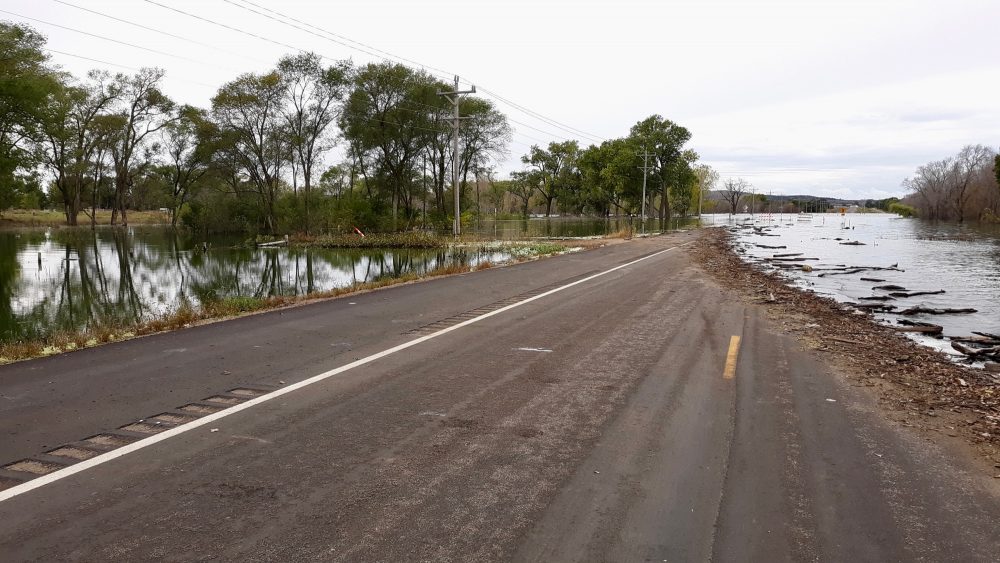Persistence and Resilience for Community Recovery

A natural disaster often reveals an un-natural disaster, the systemic and longstanding issues that have gone unaddressed for decades, the disinvestment in Indigenous communities and the lack of compassion for those that “choose to live that way.”
But a disaster also reveals the strength, social capital and scrappy ingenuity of a community determined to survive, to make sure everyone has food, that children have beds and clean clothes and, perhaps most importantly, a place to belong and call home. In our first conversations with members of the White Swan Community, we met a true champion named Shelly Saunsoci who is leading her community through the challenge of recovery.
White Swan, a housing community of 89 homes owned by the Yankton Sioux Tribe and rented to tribal members near Lake Andes, South Dakota, is home to more than 300 tribal members, including 177 children and 33 elders. Major flooding that began in March 2019 and continued throughout the summer made the main road to White Swan and the town of Lake Andes impassible. In September, the area was inundated with an additional 7-8 inches of rain, resulting in even more flooding.
The White Swan Community Center, although partially flooded, remained open for meals and a safe, warm place for community members to gather. Shelly, whose office is next door, and the “grandmas” (area elders) unofficially managed the community center, organized and handed out donations, and created an informal emergency operations center.
After a long winter, the spring thaw revealed significant damage to roads, infrastructure and homes. Children, coming to the community center for homework support and snacks, were reporting respiratory illnesses, sleeping on moldy beds and were wearing clothes that reeked of mold. Multiple requests were made for support and assistance. Some were answered. Most were not. But this resilient community remained persistent.
 Heidi Schultz, CDP’s new Tribal Recovery program manager, reached out to Shelly after reading about the community’s hardships in an article by The Guardian. Subsequently, the Midwest Early Recovery Fund awarded a grant to support development and capacity building for the newly formed White Swan Recovery Group in Feb. 2020. Our first step was to provide the community with our new Midwest Early Recovery Fund Needs Assessment tool to better understand the damage caused by floodwaters and mold to housing and evaluate and prioritize needs.
Heidi Schultz, CDP’s new Tribal Recovery program manager, reached out to Shelly after reading about the community’s hardships in an article by The Guardian. Subsequently, the Midwest Early Recovery Fund awarded a grant to support development and capacity building for the newly formed White Swan Recovery Group in Feb. 2020. Our first step was to provide the community with our new Midwest Early Recovery Fund Needs Assessment tool to better understand the damage caused by floodwaters and mold to housing and evaluate and prioritize needs.
Despite the challenges of COVID-19, which has only heightened the community’s needs and revealed even more disparities, the White Swan Recovery Group and its leaders are making significant progress.
With the help of the Needs Assessment tool, we found that a shocking 80 percent of those surveyed identified food as their primary need, followed closely by the need for mold remediation.
With funds from the Midwest Early Recovery Fund, the community has now been able to build their own capacity for mold removal and will no longer need to rely on outside assistance, an important move for this isolated reservation. Additionally, the recovery group has been working tirelessly to locate food sources for community members and distribute that food, prioritizing children and elders. The need for food continues to be persistent and significant, but they are building their capacity to become a food pantry, increasing the amount and frequency of food distributions, and bringing it right to White Swan.
Community champions continue to meet each new challenge with ingenuity and creativity despite COVID-19 infections among some committee members and many starts and stops due to stay-at-home orders. Our current, favorite creative solution is a “drive-up window with drawer” like you use at the bank or pharmacy to be installed on the side of the community center. Residents can drop off applications for assistance, and staff can distribute snacks and resources as well as refill hand sanitizer bottles in a COVID-safe manner. Their resilience is both humbling and inspiring.
We are proud to support the White Swan Recovery Group of the Yankton Sioux Reservation in South Dakota. You can read more about the community and our assessed needs and recommendations on our disaster profile.